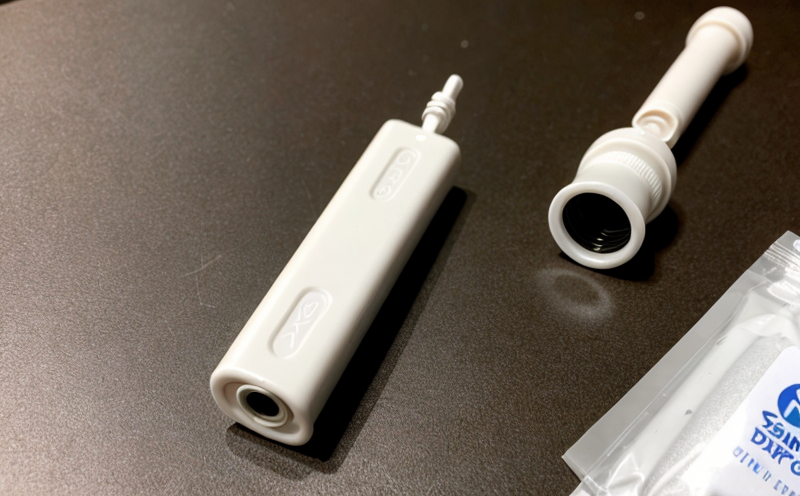ASTM F1980 Accelerated Aging Shelf Life Testing Validation Method Development Test
The ASTM F1980 standard is a cornerstone in the medical device industry for ensuring the reliability and shelf life of disposable and single-use devices. This accelerated aging shelf life testing validation method development test plays a critical role in validating the shelf life of these devices under controlled environmental conditions, ensuring they remain effective over their intended storage period.
The process involves exposing samples to high-temperature and humidity conditions designed to accelerate degradation processes that would occur during normal use or storage. This ensures that any potential failures due to aging can be identified early in the development phase. By following this stringent protocol, manufacturers can provide products with reliable shelf lives, thereby enhancing patient safety and regulatory compliance.
The ASTM F1980 test is particularly relevant for single-use devices like catheters, syringes, and surgical instruments. It helps to validate that these devices do not lose functionality or integrity over time. This method development process involves multiple iterations to refine the testing parameters until a validated shelf life can be established.
The first step in this test is careful specimen preparation. Samples must be representative of the final product, ensuring uniformity across all tested units. Following preparation, samples are subjected to controlled environmental conditions that mimic real-world storage scenarios but accelerate aging processes. This typically involves exposing them to temperatures ranging from 40°C to 60°C and relative humidity levels between 75% and 85%. These conditions can simulate the effects of extended shelf life in a laboratory setting, allowing manufacturers to identify potential issues early.
Instrumentation plays a crucial role in this process. Devices are often tested using environmental chambers that can maintain precise temperature and humidity settings. Advanced monitoring systems ensure data accuracy throughout the test duration, providing valuable insights into how materials react under these conditions. Data collected during testing is analyzed meticulously to determine when degradation begins and at what rate it progresses.
Once a validated shelf life has been established through this rigorous process, manufacturers can confidently specify storage conditions for their products. This not only enhances product quality but also supports compliance with regulatory standards such as ISO 10993-1. By ensuring that devices remain safe and effective throughout their intended shelf life, companies demonstrate a commitment to both patient safety and regulatory adherence.
The ASTM F1980 test is widely accepted globally due to its robust methodology and reproducibility. It provides a standardized approach for validating shelf life, which is essential for maintaining consistent quality across different manufacturing batches and locations.
Why Choose This Test
Selecting the ASTM F1980 accelerated aging shelf life testing validation method development test offers several advantages over other approaches. Firstly, it provides a standardized way to validate shelf life, ensuring consistency across various manufacturing batches and locations. Secondly, this testing methodology accelerates degradation processes that would otherwise occur during normal use or storage conditions, allowing manufacturers to identify potential issues early in the product lifecycle.
One of the primary reasons for choosing this test is its ability to provide reliable data on how materials behave under extreme environmental conditions. This information is invaluable for refining product design and improving overall performance. Additionally, by adhering to internationally recognized standards like ASTM F1980, companies can ensure that their products meet stringent regulatory requirements.
The test also supports quality assurance efforts by providing a clear roadmap for validating shelf life. This ensures that manufacturers can confidently specify storage conditions for their products, enhancing both product safety and compliance with relevant regulations. Furthermore, the detailed data collected during testing allows for continuous improvement of manufacturing processes, leading to higher-quality products.
Another significant benefit of using ASTM F1980 is its wide acceptance within the industry. Many regulatory bodies consider adherence to this standard as proof of quality assurance efforts. This can help streamline the product development process and reduce time-to-market by ensuring that critical tests are completed early in the lifecycle.
In summary, choosing the ASTM F1980 accelerated aging shelf life testing validation method development test offers numerous benefits for medical device manufacturers. It provides a standardized approach to validating shelf life, accelerates degradation processes, supports quality assurance efforts, and ensures compliance with regulatory requirements. These advantages make it an essential tool in ensuring product reliability and enhancing patient safety.
International Acceptance and Recognition
- The ASTM F1980 accelerated aging shelf life testing validation method development test is widely recognized by various regulatory bodies worldwide, including the FDA (United States), MHRA (United Kingdom), and CE marking authorities in Europe.
- This standard is also accepted by international organizations such as the World Health Organization (WHO) and the International Organization for Standardization (ISO).
- Many medical device manufacturers around the globe use ASTM F1980 to ensure that their products meet stringent quality and safety standards, thereby facilitating smoother market entry in different countries.
The widespread acceptance of this test underscores its importance in ensuring consistent product performance across diverse environments. By adhering to internationally recognized standards like ASTM F1980, manufacturers can demonstrate a commitment to maintaining high-quality products that meet regulatory requirements globally.





